
Wordlist
.pdf
in company Elementary
 Unit 16
Unit 16
headword |
pronunciation |
translation/notes |
example sentence |
|
|
|
|
crèche (n) |
\kreS\ |
|
|
workplace crèches (n pl) |
\Æw‰…kpleIs "kreS´z\ |
|
Workplace crèches can be a good idea for workers with babies and young |
|
|
|
children. |
doctor’s note (n) |
\"dÅkt´z Æn´Ut\ |
|
You need a doctor’s note if you’re absent for longer than three days. |
feel well |
\Æfi…l wel\ |
|
David phoned in, saying he wasn’t feeling well. |
(opposite = feel ill/sick) |
|
|
|
fitness programme (n) |
\"fItn´s Æpr´Ugrœm\ |
|
Fitness programmes can help employees stay fit and healthy. |
flu (n) |
\flu…\ |
|
|
have got flu |
\h´vÆ gÅt "flu…\ |
|
I think I’ve got a bit of flu. |
global capitalism (n) |
\Ægl´Ubl |
|
“World Phone in Sick Day” was a day of protest against global capitalism. |
|
"kœpIt´ÆlIz´m\ |
|
|
go in (phr v) |
\Æg´U "In\ |
|
The decision about whether to go in or to stay at home can be a difficult one. |
illness (n) |
\"Iln´s\ |
|
According to a recent survey, British employees had an average of 7.8 days off |
|
|
|
work for illness last year. |
infect (v) |
\In"fekt\ |
|
If you go into work when you’re feeling ill, you risk infecting your workmates. |
job swapping (n) |
\"dZÅb ÆswÅpIN\ |
|
Job swapping involves allowing one person to do another person’s job. |
lie down (phr v) |
\ÆlaI "daUn\ |
|
If you’re not feeling well, go and lie down for a while. |
low morale (n) |
\Æl´U m´"rA…l\ |
|
Managers suspect that low morale is often the real reason for a lot of absences |
|
|
|
from work. |
massage service (n) |
\"mœsA…Z Æs‰…vIs\ |
|
The massage service we introduced a year ago has proved very popular with |
|
|
|
employees. |
This file has been downloaded from www.businessenglishonline.net |
2 |
|
It is photocopiable, but all copies must be complete pages. © Macmillan Publishers Limited 2004.

in company Elementary
 Unit 16
Unit 16
headword |
pronunciation |
translation/notes |
example sentence |
|
|
|
|
migraine (n) |
\"mi…greIn; |
|
"maIgreIn\ |
Monday morning blues (n pl) |
\ÆmøndeI ÆmO…nIN |
|
"blu…z\ |
non-union (adj) |
\ÆnÅn"ju…nj´n\ |
non-union workers (n pl) |
\ÆnÅnÆju…nj´n |
|
"w‰…k´z\ |
office gossip (n) |
\ÆÅfIs "gÅsIp\ |
phone in sick |
\Æf´Un ÆIn "sIk\ |
positive action (n) |
\ÆpÅz´tIv "œkSn\ |
take positive action |
\teIk ÆpÅz´tIv |
|
"œkSn\ |
private (adj) |
\ÆpraIv´t\ |
private company (n) |
\ÆpraIv´t |
|
"kømp“´‘nI\ |
the private sector (n) |
\D´ "praIv´t Æsekt´\ |
product launch (n) |
\"prÅdøkt ÆlO…ntS\ |
public (adj) |
\ÆpøblIk\ |
public service (adj) |
\ÆpøblIk "s‰…vIs\ |
public services (n pl) |
\ÆpøblIk "s‰…vIs´z\ |
This file has been downloaded from www.businessenglishonline.net
It is photocopiable, but all copies must be complete pages. © Macmillan Publishers Limited 2004.
A migraine is a very severe headache.
Monday morning blues is an expression meaning the sad, unhappy feeling some people have on Monday, the first day of the working week.
Trade union members report sick more often than non-union workers.
My secretary tells me all the office gossip.
“Is John coming in today?” “No, he’s just phoned in sick.”
Flexible working hours and bonus schemes are just two examples of positive action employers can take to reduce absenteeism.
Employees who work for private companies take less time off work than those working in public services.
Absenteeism is lower in the private sector than in public services.
We really need you tomorrow to help with the product launch.
Public service workers take more time off than those working for private companies.
Who takes more time off – those working in the private sector or in public services?
3

in company Elementary
 Unit 16
Unit 16
headword |
pronunciation |
translation/notes |
example sentence |
|
|
|
|
relaxation areas (n pl) |
\Æri…lœk"seISn |
|
Æe´rI´z\ |
sick |
\sIk\ |
report sick |
\rIÆpO…t "sIk\ |
sick leave (n) |
\"sIk Æli…v\ |
sick note (n) |
\"sIk "n´Ut\ |
sickie (n) |
\"sIkI\ |
throw a sickie |
\ÆTr´U ´ "sIkI\ |
teamwork (n) |
\"ti…mÆw‰…k\ |
temperature (n) |
\"temprIÆtS´\ |
have a temperature |
\Æhœv ´ |
|
"temprIÆtS´\ |
trade union (n) |
\ÆtreId "ju…nj´n\ |
trade union members (n pl) |
\ÆtreId "ju…nj´n |
|
Æmemb´z\ |
travel expenses (n pl) |
\"trœvl IkÆspens´z\ |
union (n) |
\"ju…j´n\ |
utilities (n pl) |
\ju…"tIl´tIz\ |
work |
\"w‰…k\ |
workforce (n) |
\"w‰…kÆfO…s\ |
This file has been downloaded from www.businessenglishonline.net
It is photocopiable, but all copies must be complete pages. © Macmillan Publishers Limited 2004.
We provide special relaxation areas for employees to use during coffee breaks and their lunch break.
Non-union workers report sick less often than trade union members.
The average amount of sick leave taken by British employees in 2003 was 7.8 days.
You need a sick note from the doctor for absences of longer than three days.
“Throwing a sickie” is an expression meaning to pretend to be ill and not go to work.
Effective teamwork is an important part of this job.
My son has a temperature so I’m taking him to the doctor’s.
Trade union members are more likely to report sick than non-union workers.
The company pays all my travel expenses.
Who takes more time off work – workers who belong to unions or workers who don’t?
The utilities are gas, water and electricity.
For the whole workforce in Britain, absenteeism represents a total of £10.7 billion in lost revenue.
4
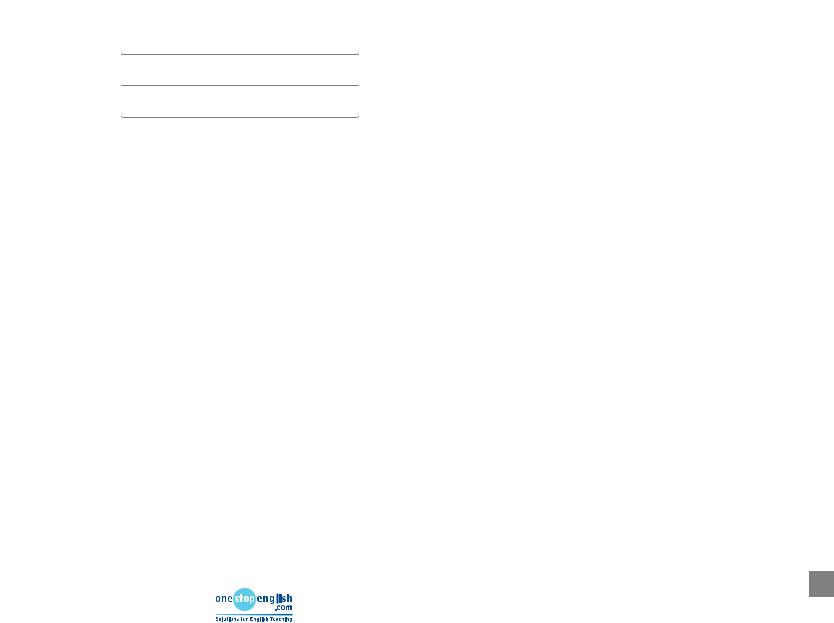
in company Elementary
 Unit 16
Unit 16
headword |
pronunciation |
translation/notes |
example sentence |
|
|
|
|
working time (n) |
\Æw‰…kIN "taIm\ |
|
In 2003 in Britain, 3.4 per cent of total working time was lost due to illness. |
working week (n) |
\Æw‰…kIN "wi…k\ |
|
In your opinion, would a shorter working week help to reduce absenteeism? |
workmate (n) |
\"w‰…kÆmeIt\ |
|
If you go into work when you’re ill, you risk infecting your workmates. |
This file has been downloaded from www.businessenglishonline.net |
5 |
|
It is photocopiable, but all copies must be complete pages. © Macmillan Publishers Limited 2004.
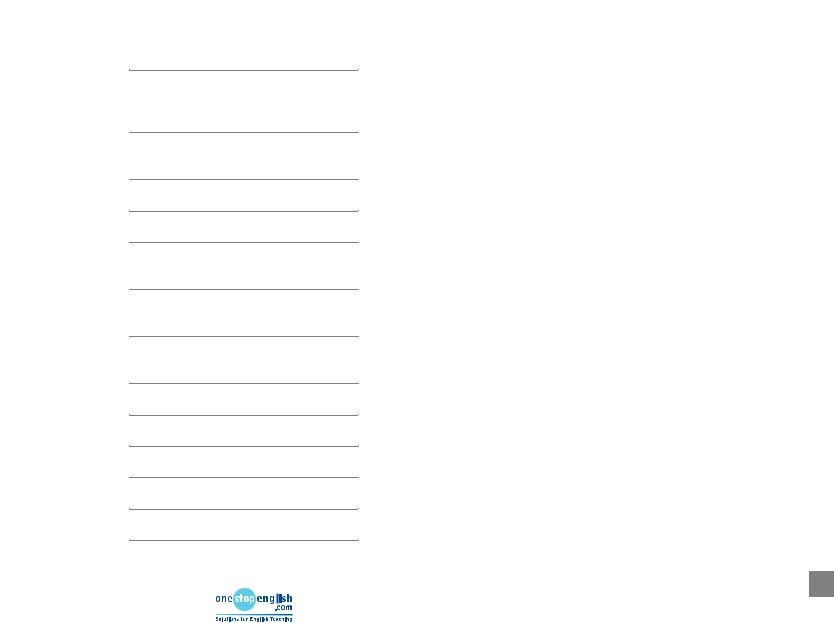
in company Elementary
 Unit 17
Unit 17
headword |
pronunciation |
translation/notes |
example sentence |
|
|
|
|
advance (n) |
\´d"vA…ns\ |
|
years/months/days etc |
\ÆjI´z\ÆmønTs\ÆdeIz In |
Clothes makers usually produce their collections months in advance. |
in advance |
´d"vA…ns\ |
|
agreement (n) |
\´"gri…m´nt\ |
|
commercial agreement (n) |
\k´Æm‰…Sl ´"gri…m´nt\ |
As part of a series of commercial agreements, the brand of vodka in the James |
|
|
Bond films has changed. |
annual growth (n) |
\Æœnju´l "gr´UT\ |
Annual growth is the increase in the GDP (Gross Domestic Product) in one year. |
anticipate (v) |
\œn"tIsIÆpeIt\ |
Clothes makers have to anticipate fashion trends. |
batch (n) |
\bœtS\ |
Production is in small batches, or quantities. |
borrow (v) |
\"bÅr´U\ |
|
borrow from a bank |
\ÆbÅr´U fr´m ´ "bœNk\ |
Public debt is the amount of money the government owes because it borrows |
|
|
from banks. |
boss (n) |
\bÅs\ |
|
the boss of |
\D´ "bÅs ´v\ |
Amancio Ortega is the founder and boss of Zara and Inditex. |
business (n) |
\"bIzn´s\ |
|
business life (n) |
\"bIzn´s ÆlaIf\ |
He started business life in a small clothes shop. |
business school (n) |
\"bIzn´s Æsku…l\ |
Ortega gave talks in business schools around the world. |
on business |
\ÆÅn "bIzn´s\ |
He’s in Germany on business. |
set up a business |
\Æset øp ´ "bIzn´s\ |
Last year she set up her own Internet property selling business. |
clothes maker (n) |
\"kl´UDz ÆmeIk´\ |
Ortega is boss of one of the most successful clothes makers in the world. |
collection (n) |
\k´"lekSn\ |
A “collection” is a term referring to the clothes that a manufacturer produces for |
|
|
sale at a particular time of year. |
This file has been downloaded from www.businessenglishonline.net |
1 |
|
It is photocopiable, but all copies must be complete pages. © Macmillan Publishers Limited 2004.
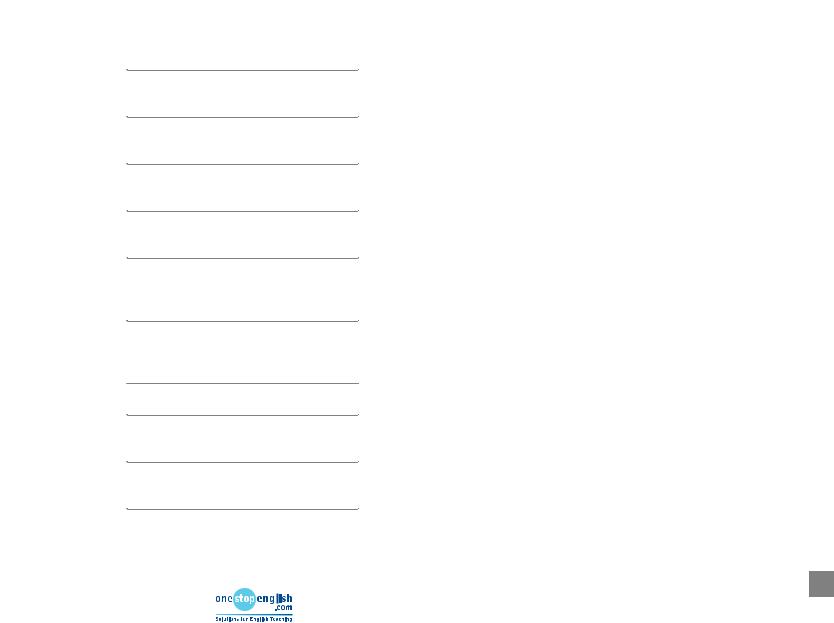
in company Elementary
 Unit 17
Unit 17
headword |
pronunciation |
translation/notes |
example sentence |
|
|
|
|
contact (n) |
\"kÅnÆtœkt\ |
|
be in daily contact (with) |
\Æbi… In ÆdeIlI |
Inditex headquarters is in daily contact with its stores and knows what is selling. |
|
"kÅnÆtœkt wID\ |
|
conventional (adj) |
\k´n"venSn“´‘l\ |
Product placement in films is cheaper than conventional advertising. |
(opposite = unconventional) |
|
|
cost effective (adj) |
\"kÅst IÆfektIv\ |
Something that is cost effective produces a good profit in exchange for the |
|
|
amount of money spent. |
counter (n) |
\"kaUnt´\ |
|
over the counter |
\Æ´Uv´ D´ "kaUnt´\ |
He started business life in a local clothes shop, selling over the counter to |
|
|
housewives. |
do well |
\Ædu… "wel\ |
The lingerie business that Ortega set up with his wife did well. |
(opposite = do badly) |
|
|
fashion (n) |
\"fœSn\ |
|
fashion director/ |
\"fœSn d´Ærekt´\ |
It’s essential that fashion manufacturers anticipate fashion trends. |
manufacturer/trend etc |
ÆmœnjUÆfœktS´r´\ |
|
|
Ætrend\ |
|
foreign currency (n) |
\ÆfÅrIn "kør´nsI\ |
What amount of money in foreign currencies does the government have? |
foreign exchange reserves |
\ÆfÅrIn Iks"tSeIndZ |
The foreign exchange reserves are the amount of money in foreign currencies that |
(n pl) |
rIÆz‰…vz\ |
the government has. |
found (v) |
\faUnd\ |
According to Piette, Ortega has founded “possibly the most innovative and |
|
|
devastating retailer in the world”. |
founder (n) |
\"faUnd´\ |
|
the founder of |
\D´ "faUnd´ ´v\ |
Amancio Ortega is the founder and boss of Zara and Inditex. |
This file has been downloaded from www.businessenglishonline.net |
2 |
|
It is photocopiable, but all copies must be complete pages. © Macmillan Publishers Limited 2004.
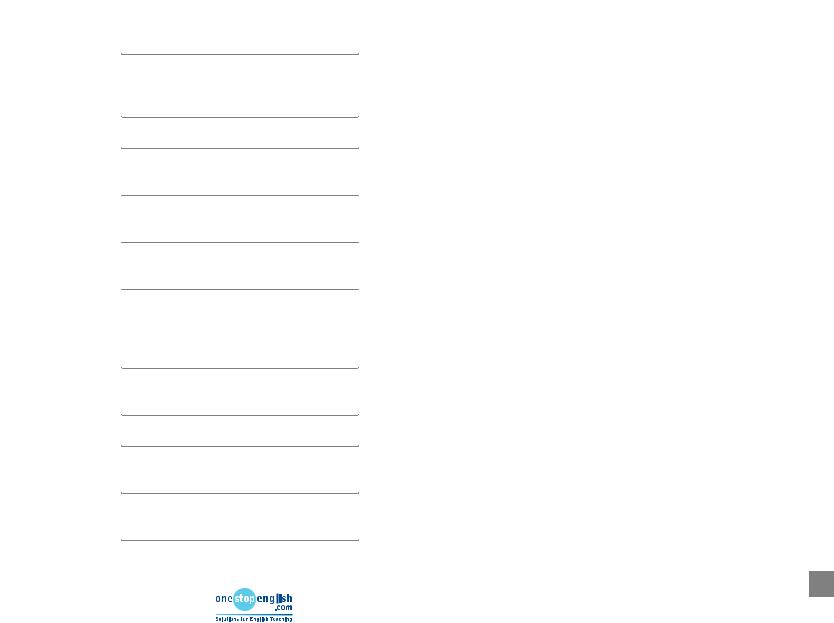
in company Elementary
 Unit 17
Unit 17
headword |
pronunciation |
translation/notes |
example sentence |
|
|
|
|
global awareness (n) |
\Ægl´Ubl ´"we´n´s\ |
|
Product placement in films is a good way of creating global awareness of a |
create global awareness |
\kri…ÆeIt Ægl´Ubl |
|
product. |
|
´"we´n´s\ |
|
|
global campaign (n) |
\"gl´Ubl kœm"peIn\ |
|
Smaller companies can’t afford the global campaigns of large multinationals. |
go up (phr v) |
\Æg´U "øp\ |
|
Prices are going up the fastest in Portugal and Germany. |
(opposite = go down) |
|
|
|
government spending (n) |
\Ægøvnm´nt "spendIN\ |
|
Government spending is the amount of money the government spends on things |
|
|
|
like education, health and defence. |
grow (v) |
\gr´U\ |
|
The Inditex group is growing at a phenomenal rate. |
headquarters (n) |
\hed"kwO…t´z\ |
|
|
Inditex/Microsoft etc |
\ÆIndIÆteks\ |
|
Inditex headquarters is in contact with its stores on a daily basis. |
headquarters |
ÆmaIkr´ÆsÅft |
|
|
|
hed"kwO…t´z\ |
|
|
increase (n) |
\"INkri…s\ |
|
|
increase in |
\"INkri…s ÆIn\ |
|
The increase in the GDP in one year is known as “annual growth”. |
(opposite = decrease in) |
|
|
|
inflation (n) |
\In"fleISn\ |
|
Annual inflation is the yearly increase in the price of services and things we buy. |
in-house (adv) |
\ÆIn"haUs\ |
|
The group manufactures most of its clothes in-house. |
(opposite = out-of-house) |
|
|
|
innovative (adj) |
\"In´Æv´tIv\ |
|
An innovative company is one that is not afraid to introduce new ideas, |
|
|
|
production methods etc. |
item (n) |
\"aIt´m\ |
|
If an item doesn’t sell in our shops, we stop making it. |
This file has been downloaded from www.businessenglishonline.net |
3 |
|
It is photocopiable, but all copies must be complete pages. © Macmillan Publishers Limited 2004.
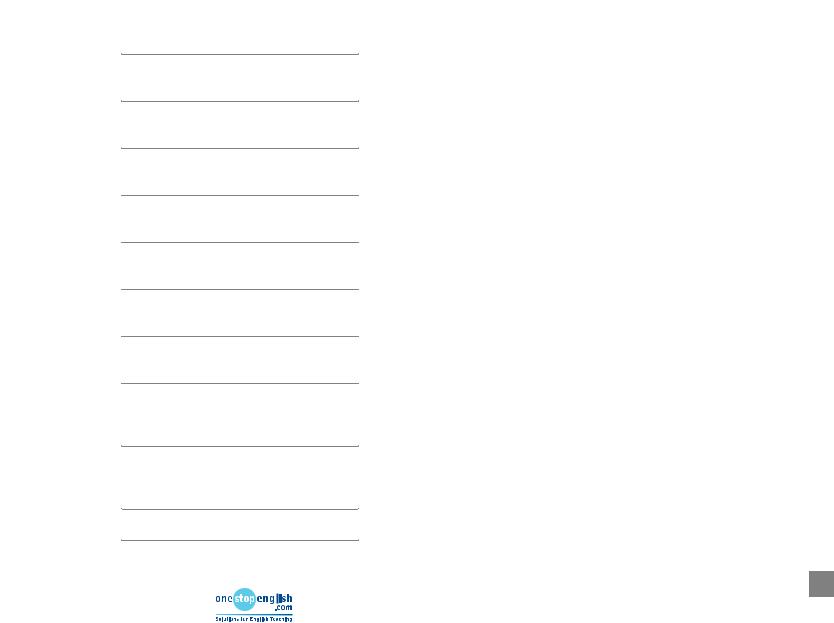
in company Elementary
 Unit 17
Unit 17
headword |
pronunciation |
translation/notes |
example sentence |
|
|
|
|
labour cost (n) |
\"leIb´ ÆkÅst\ |
|
Labour costs are much cheaper in parts of Asia and Eastern Europe than they are |
|
|
|
in the UK. |
manufacture (v) |
\ÆmœnjU"fœktS´\ |
|
Most of our clothes are manufactured in-house. |
message (n) |
\"mesIdZ\ |
|
|
take a message |
\ÆteIk ´ "mesIdz\ |
|
Mr Harper’s not in the office. Can I take a message? |
money (n) |
\"mønI\ |
|
|
make money |
\ÆmeIk "mønI\ |
|
Ortega is an expert at making money. |
over (prep) |
\"´Uv´\ |
|
|
just over |
\ÆdZøst "´Uv´\ |
|
In France GDP has increased by just over $3,000. |
(opposite = under) |
|
|
|
overheads (n pl) |
\"´Uv´Æhedz\ |
|
Overheads are the general costs of running a business – rent, equipment, heating, |
|
|
|
lighting etc. |
owe (v) |
\´U\ |
owe money |
\Æ´U "mønI\ |
president (n) (AmE) |
\"prezId´nt\ |
the president of |
\D´ "prezId´nt ´v\ |
(BrE = managing director) |
|
process (n) |
\"pr´Uses\ |
every stage of the process |
\ÆevrI ÆsteIdZ ´v D´ |
|
"pr´Uses\ |
product (n) |
\"prÅdøkt\ |
product preference (n) |
\"prÅdøkt |
|
Æprefr´ns\ |
a range of products (n) |
\´ ÆreIndZ ´v |
|
"prÅdøkts\ |
This file has been downloaded from www.businessenglishonline.net
It is photocopiable, but all copies must be complete pages. © Macmillan Publishers Limited 2004.
Public debt is the amount of money the government owes.
The president and founder of Inditex is rich and successful.
Inditex controls every stage of the process – from production to sales.
The article “To Shake Or To Stir?” describes changes in Bond’s product preferences.
The makers of the Bond films have accepted $40–45m to allow a range of products to appear on screen.
4
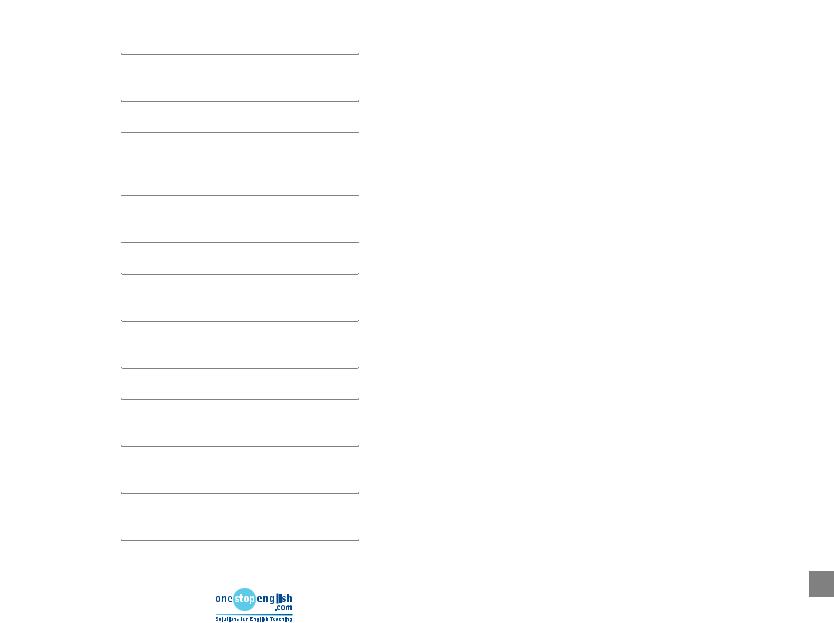
in company Elementary
 Unit 17
Unit 17
headword |
pronunciation |
translation/notes |
example sentence |
|
|
|
|
product placement (n) |
\"prÅdøkt |
|
Product placement is the use of a particular company’s products during a film as a |
|
"pleIsm´nt\ |
|
way of advertising. |
production (n) |
\pr´"døkSn\ |
|
From production to sales – we control every stage of the process. |
economic production (n) |
\Æi…k´ÆnÅmIk; |
|
GDP per person is the total economic production of a country divided by the |
|
Æek´ÆnÅmIk |
|
number of its people. |
|
pr´"døkSn\ |
|
|
public debt (n) |
\ÆpøblIk "det\ |
|
The amount of money that the government owes because it borrows from banks is |
|
|
|
called the public debt. |
rate of pay (n) |
\ÆreIt ´v "peI\ |
|
The hourly rate of pay for the job is £7.50. |
retailer (n) |
\"ri…ÆteIl´\ |
|
Daniel Piette, a fashion director, described Inditex as “possibly the most innovative |
|
|
|
… retailer in the world”. |
sales (n pl) |
\seIlz\ |
|
|
increase sales |
\INÆkri…s "seIlz\ |
|
Aston Martin is hoping to increase sales from 1,500 to 5,000 vehicles a year |
|
|
|
worldwide. |
seat (n) |
\sI…t\ |
|
|
Have a seat. |
\Æhœv ´ "si…t\ |
|
Have a seat. Would you like a coffee? |
sell (v) |
\sel\ |
|
If an item doesn’t sell we stop making it. |
shares (n pl) |
\Se´z\ |
|
|
have shares in |
\hœv "Se´z In\ |
|
Ortega has shares in football clubs. |
stock (n) |
\stÅk\ |
|
|
unsold stock |
\Æøns´Uld "stÅk\ |
|
The Inditex stores never have unsold stock. |
store (n) |
\stO…\ |
|
|
open a store |
\Æ´Up´n ´ "stO…\ |
|
Every 48 hours, somewhere in the world, the Inditex group opens a new store. |
This file has been downloaded from www.businessenglishonline.net |
5 |
||
|
|||
It is photocopiable, but all copies must be complete pages. © Macmillan Publishers Limited 2004.
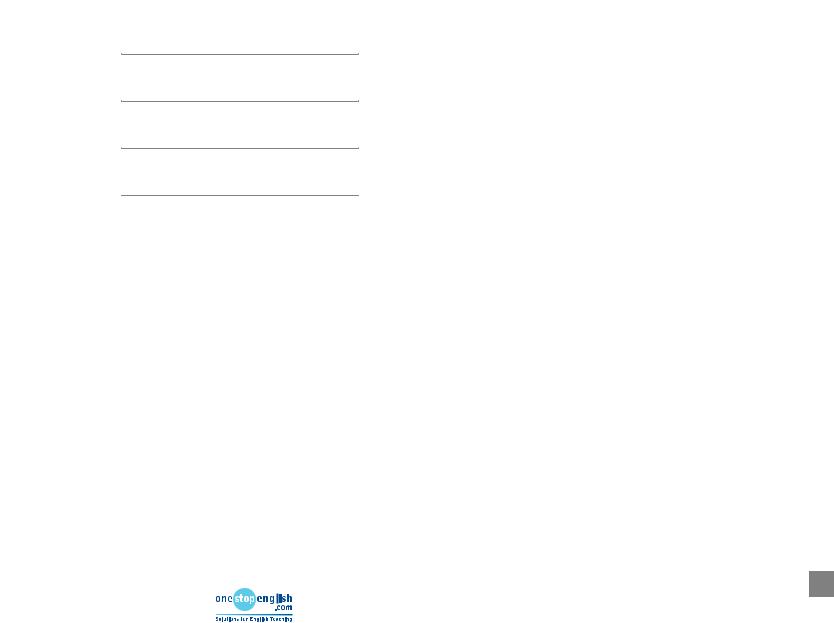
in company Elementary
 Unit 17
Unit 17
headword |
pronunciation |
translation/notes |
example sentence |
|
|
|
|
spokesman (n) |
\"sp´UksÆm´n\ |
|
“We want to create global awareness,” said a spokesman for the car company. |
under (prep) |
\"ønd´\ |
|
|
just under |
\"dZøst "ønd´\ |
|
Just under 200 people attended the conference. |
(opposite = over) |
|
|
|
unemployment rate (n) |
\ÆønIm"plOIm´nt |
|
The unemployment rate in Italy is currently 9.5%. |
|
ÆreIt\ |
|
|
yearly (adj) |
\"jI´lI\ |
|
The yearly increase in services and the things we buy is known as “annual |
|
|
|
inflation”. |
This file has been downloaded from www.businessenglishonline.net |
6 |
|
It is photocopiable, but all copies must be complete pages. © Macmillan Publishers Limited 2004.
